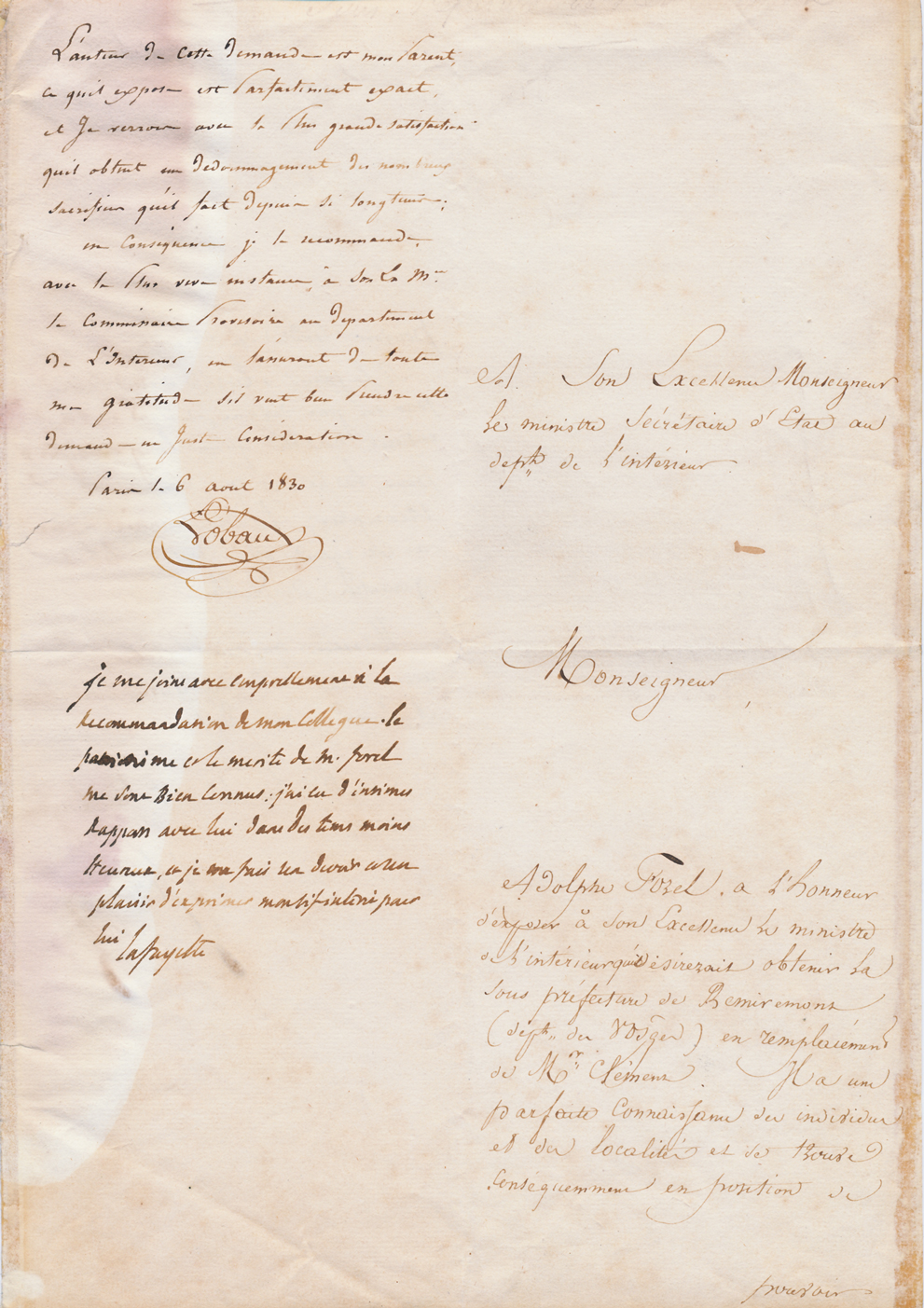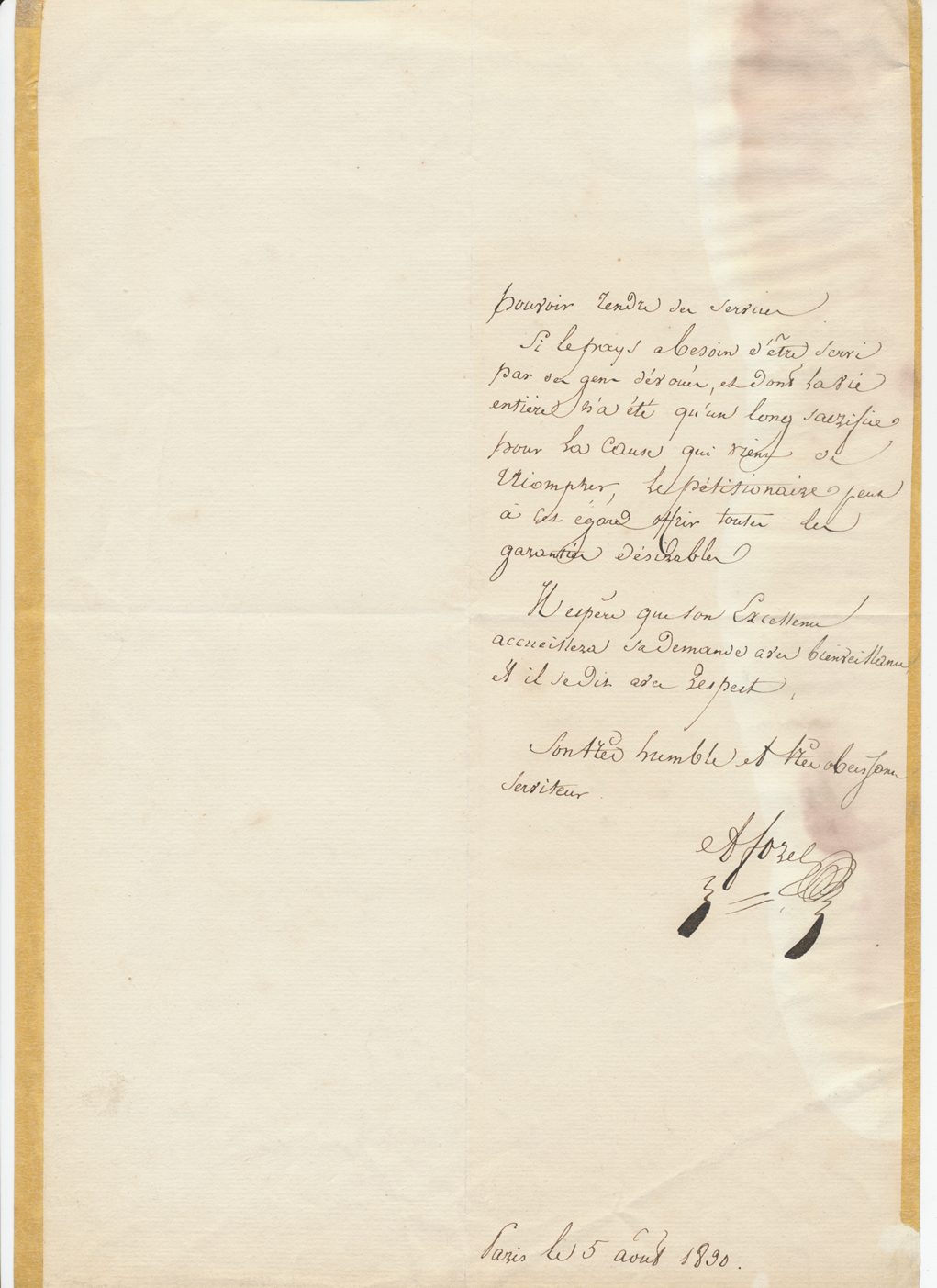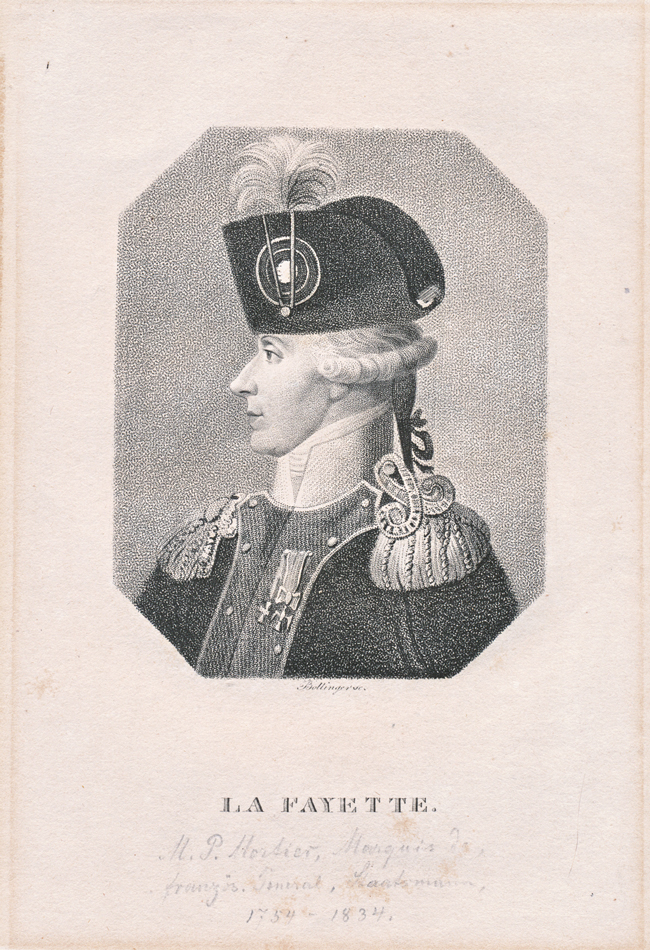Marquis de Lafayette
Marquis de Lafayette
Autographed Endorsement Signed - 1830
Autographed Endorsement Signed, in French, 1pp with integral leaf, 12 3/4 H x 8 1/4 W, Paris, France, 6 August 1830. Endorsement for Adolphe Forel. Water stain on left edge, aged masking tape on extreme edges all around (can easily be framed out), some mild toning and light wrinkling, otherwise good condition.
TRANSLATIONS
To His Excellency, Monseigneur, the Secretary of State of the Department of the Interior
Monseigneur,
Adolphe Forel has the honor to inform His Excellency the Secretary of the Interior that he wishes to be named to the sub-prefecture of Remiremont (Département of the Vosges) to replace Mr. Clemens. He has full knowledge of the people and place and consequently is in a position to be able to offer to serve. If the country has a need to be served by devoted people, whose entire life has been but a long sacrifice for the cause that has just triumphed, the petitioner can in this respect offer all the desirable guarantees. He hopes that his Excellency will favorably receive his request and he [illegible] with respect.
His very humble and very obedient servant,
A Forel
Paris, August 5, 1830
[Endorsement]
The author of this request is my relative, what he writes is entirely true and I would view with the greatest satisfaction that he be compensated for the numerous sacrifices that he has made for so long. Consequently, I recommend him in the strongest possible way to His Excellency the Acting Commissioner of the Department of the Interior, with the assurances of all my gratitude if he would be so grateful as to give due consideration to this request.
Paris, August 6, 1830
Lobau
[Endorsement]
I join with [illegible] the recommendation of my colleague. The [illegible] and merits of Mr. Forel are well known to me. I have had close relations with him in less happy times and I consider it my duty and pleasure to express my [illegible] for him.
Lafayette
Gilbert du Motier, marquis de la Fayette (1757-1834), commonly known in English as Marquis de Lafayette, was a French military officer and aristocrat who participated in both the American and French revolutions. He permanently renounced the nobility and the title “Marquis” before the French National Assembly on 19 June 1790. Lafayette served in the American Revolutionary War both as a general and as a diplomat. He served entirely without pay in both roles, which he was able to do due to his family’s immense wealth as feudal landowners. Later, he was to prove a key figure in the early phases of the French Revolution, serving in the Estates General and the subsequent National Constituent Assembly. He was a leading figure among the Feuillants, who tried to turn France into a constitutional monarchy, and commander of the French National Guard.
Accused by Jean-Paul Marat of responsibility for the “Massacre of the Champ de Mars” (before which Lafayette was nearly assassinated), he subsequently was forced out of a leading role in the Revolution by Jacobin-Terror anarchists. On 19 August 1792 the Jacobin party seized control of Paris and the National Assembly, ordering Lafayette’s arrest. He fled France and was arrested by the Austrian army in Rochefort, Belgium. Thereafter, he spent five years in various Prussian / Austrian prisons allied with the British Empire. After a strenuous effort by his wife, that was aided by the French Directory that forced Napoleon’s Army toward Austria, he was released in 1797; however, Napoleon did not want Lafayette to return to France and hoped he would leave forever to the United States. After three years in exile he quietly returned (aided again by his wife) and continued to be active in French and European politics until his death in 1834.
About Georges Mouton, comte de Lobau
Georges Mouton, comte de Lobau (1770-1838) was a French soldier and political figure who rose to the rank of Marshal of France.
Born in Phalsbourg, Lorraine, he enlisted in the French Revolutionary Army in 1792. Serving in the early campaigns of the French Revolutionary Wars, he by 1800 he was promoted to the rank of colonel.
Promoted to général de brigade in 1805, after the establishment of the French Empire, and général de division in 1807, Lobau distinguished himself in the battles of Jena and Aspern, Lützen, Bautzen. During the Russian Campaign, he acted as a senior aide-de-camp to Emperor Napoleon I of France, whom he accompanied back to France. In 1810, he was created count of Lobau in recognition of his role in the battle of Aspern.
After Dominique Vandamme was made prisoner during the battle of Kulm, Lobau commanded the retreat of the remnants of the corps. He served under Laurent Gouvion Saint-Cyr when, upon the retreat after the battle of Leipzig, the latter was trapped in Dresden and after the surrender of these forces he became a prisoner of the Austrian Empire for the rest of the war.
During the Hundred Days, Lobau rallied to Napoleon and was made commander of the VI Infantry Corps which he led in the battles of Ligny and Waterloo.
After the Second Restoration, Lobau was forced to go into exile until he was allowed to return to France in 1818. He was elected to the House of Representatives from 1828 to 1830 as a liberal, and, in 1830, he joined the July Revolution as commander of the National Guard.
As a reward for his services to King Louis-Philippe he was made a Marshal in 1831, the same year he was made a Peer of France. In 1832 and 1834, Lobau was assigned to suppress insurrections, a task in which he was successful. George Mouton, comte de Lobau died in Paris.
About Adolphe Claude Michel Catherine Forel
The only information we have available on M. Forel is his date and place of birth: 15 February 1797 in Meurthe-et-Moselle – Nancy.
All Vintage Memorabilia autographs are unconditionally guaranteed to be genuine. This guarantee applies to refund of the purchase price, and is without time limit to the original purchaser. A written and signed Guarantee to that effect accompanies each item we sell.



